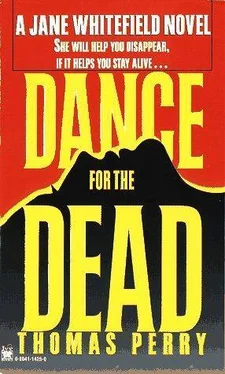Thomas Perry - Dance for the Dead
Здесь есть возможность читать онлайн «Thomas Perry - Dance for the Dead» весь текст электронной книги совершенно бесплатно (целиком полную версию без сокращений). В некоторых случаях можно слушать аудио, скачать через торрент в формате fb2 и присутствует краткое содержание. Жанр: Старинная литература, на английском языке. Описание произведения, (предисловие) а так же отзывы посетителей доступны на портале библиотеки ЛибКат.
- Название:Dance for the Dead
- Автор:
- Жанр:
- Год:неизвестен
- ISBN:нет данных
- Рейтинг книги:4 / 5. Голосов: 1
-
Избранное:Добавить в избранное
- Отзывы:
-
Ваша оценка:
- 80
- 1
- 2
- 3
- 4
- 5
Dance for the Dead: краткое содержание, описание и аннотация
Предлагаем к чтению аннотацию, описание, краткое содержание или предисловие (зависит от того, что написал сам автор книги «Dance for the Dead»). Если вы не нашли необходимую информацию о книге — напишите в комментариях, мы постараемся отыскать её.
Dance for the Dead — читать онлайн бесплатно полную книгу (весь текст) целиком
Ниже представлен текст книги, разбитый по страницам. Система сохранения места последней прочитанной страницы, позволяет с удобством читать онлайн бесплатно книгу «Dance for the Dead», без необходимости каждый раз заново искать на чём Вы остановились. Поставьте закладку, и сможете в любой момент перейти на страницу, на которой закончили чтение.
Интервал:
Закладка:
"But what if - "
"What if he said no? If Cyrus didn't bite, I'd leave him to somebody who had a pitch he liked better, and I'd go after his buddy Homer in the next town, who by now has five hundred million to move. But we hardly ever had to do that. Cyrus would have had to hunt pretty hard for a reason to turn me down, and he knew he didn't have time to hunt. He had to find jobs for his dollars."
"So you got a loan. What then?"
"Big Deals, Inc. got a loan. Big Deals spent it: building expenses, salaries, et cetera. But Big Deals neglected to pay the interest."
"What did Cyrus do about it?"
"I'll skip a few phone calls, meetings, and threats. Usually that went on for months. At some point Cyrus sees that he's got a problem. He can do several things. One is to foreclose on the land. Fine with me. I just sold a one-million-dollar chunk of Manitoba for ten million. Another is to accept my excuses and roll over the loan into a new one that includes the interest I owe him. Now it's a new loan for eleven million. Some of these banks carried loans like that for five years."
"What for?"
"Because Cyrus hasn't lost any money until he reports the loan as nonperforming. If he makes a new loan, he not only hasn't lost the ten million, he can put out another million as an asset. This satisfies the regulators, if any should ever get around to Cyrus with all the work they've got. It keeps the bank looking healthy, so Cyrus has breathing space."
"Why does he need such expensive breathing space?"
"Because he didn't make the forty million he needed to turn a profit. If he was a very quick learner, he made maybe thirty-five million: eight and three-quarters percent. He's still got to pay nine percent to the depositors, so he's maybe a million in the hole at the end of the first year. From one point of view that's not bad. It cost a million dollars to make his bank four hundred times as big as it was last year. But now he's on a treadmill that's going faster and faster. He needs to attract more brokered deposits so he can make more loans. If he gets another two hundred million, he can bring back maybe fifty or sixty million next year and easily absorb the million dollars he lost. As I said, he's not stupid. He knows that he looks great on paper as long as he's moving fast. But if somebody takes a photograph - that is, stops the action and studies it - his bank is insolvent. So now he's interested in keeping the system in motion."
There was still something missing from the story Mary Perkins was telling: who were the seven men following her? "By men he must have known you weren't going to pay the money back."
"In a way they all knew too much. See, Cyrus has been around long enough to have seen problems come and go - the oil crisis and the stock market slide in the early seventies, the inflation after that. He's a survivor. There was no question this wasn't going on forever. If he rode it out, then when it ended he'd be on top of a big company and could count the change later. But if he stopped now, he was out of business. Sometimes these guys would do anything to keep the money moving through - loan anything to anybody and then cook the books to keep the loan from going bad."
"So you got big loans and walked away with the money."
"That was my specialty. There were other people who made a lot of headlines by building screwy empires - lending themselves money to build ghost communities in the desert and paying themselves and their families fifty million in salaries for doing it. But what I'm trying to tell you is that it was all going on a long time, and the ones you've read about weren't the only ones who did it. They weren't even the only ones who got caught. They were just the ones who got convicted. They were very unlucky."
"Why unlucky?"
"It meant that one of these overworked low-level federal accountants had to get around to looking at all the loan papers, spot yours, notice there was something really wrong with the loan, ask questions, get the wrong answers, and convince his supervisor to do something about your loan instead of about somebody else's. Even then the procedures were amazing. That stuff we've all heard about the cold-eyed bank examiners popping in at dawn and padlocking everything is a myth. It never happened that way. Not once."
"You're saying it was staged for the television cameras?"
"No, the pictures were real. What you didn't see was what happened first. The regulator asks questions. Six months go by while somebody at the bank dances around. The supervisor sends his first-level letter."
"What's that?"
"They all have names like Notice of Discrepancy or Letter of Caution or Admonition. The letter describes what they found and says they want it fixed. Another six months go by, and the regulator checks the bank again and sees that you didn't fix it. He looks deeper for other problems, or he forces you to agree to move the loan over to the debit column instead of the credit column. Another six months go by and you get the Caution. Then the Admonition."
"That's ludicrous."
"Of course. The regulating procedures were left over from the days when everybody in the business was Cyrus Curbstone. If he got a letter pointing out a discrepancy, he would have been after it like it was a gaping hole in his own roof. The system was set up to say, 'Please look into this,' then 'Have you fixed it?' then 'Okay, here's how you fix it,' then 'If you don't fix it, I will,' and finally, 'Here I come.' "
"You have to wonder how any of these people got caught."
"It was like being chased by a glacier. You could live a whole life without seeing it get any closer. It was coming, sure. But there was so much time to get out of the way."
"And some waited too long."
"Only a few. About a thousand people actually got to the point where they went to trial. This meant that then-savings and loans were so out of control that the government put them at the top of the list for closure. They had to be losing millions a day for that. Then a couple of agents had to figure you were so obviously guilty that it was worth spending four years of their lives preparing the case.
A U.S. attorney had to be sure the case was a slam-dunk, so it wouldn't ruin her won-lost record. Then her boss would have to be convinced that you had stolen so much that when the case was over they could recover enough millions in civil court to repay the millions all this prosecution was costing, and enough millions more to make it look to Joe Taxpayer like they'd gotten his money back, and enough millions more so it would look like they put your head on a pole to scare off the other high rollers."
"How did that work out?"
"Not so great. In order to convict, they had to take the judge and jury through all these loan papers, land-flips, asset appraisals, and files. The average person can barely follow his own taxes. All this paper was written up to fool qualified accountants. The paper made most of these guys look like victims. For all I know plenty of them were. About a third got off. and of the others only about half got convicted of anything that carried jail time. The average sentence was three years."
"You said they were picked so there could be civil suits. Didn't they still have to face that?"
"Sure, but they all said they were broke. Even if they had a hundred million dollars in a box under their bed, they also had papers to show they owed somebody two hundred million."
"I know the government confiscated land and buildings and things. They've been selling them off for years."
"If you read that much, you don't have to ask me how that's going. The savings and loans the government took over were the worst, because that was all they had enough money for. The worst were ones where somebody had pulled land-flips to jack up an acre in the middle of a toxic waste dump from a thousand dollars to a million, and had a shady contractor put a substandard building on it so they could jack up the price of the land all around it."
Читать дальшеИнтервал:
Закладка:
Похожие книги на «Dance for the Dead»
Представляем Вашему вниманию похожие книги на «Dance for the Dead» списком для выбора. Мы отобрали схожую по названию и смыслу литературу в надежде предоставить читателям больше вариантов отыскать новые, интересные, ещё непрочитанные произведения.
Обсуждение, отзывы о книге «Dance for the Dead» и просто собственные мнения читателей. Оставьте ваши комментарии, напишите, что Вы думаете о произведении, его смысле или главных героях. Укажите что конкретно понравилось, а что нет, и почему Вы так считаете.












